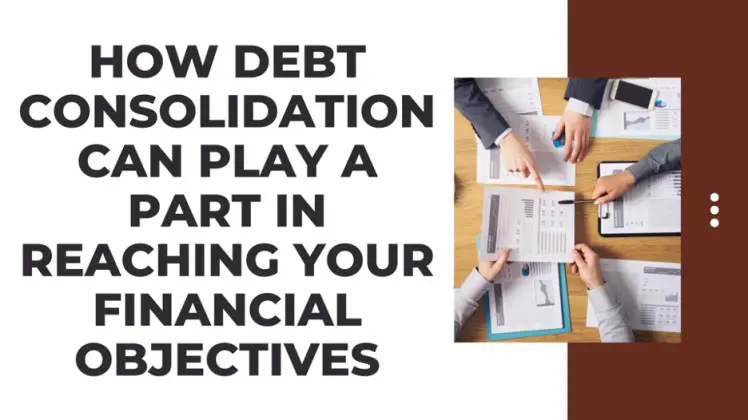
CommonCentsMom.com is advertiser-supported: we may earn compensation from the products and offers mentioned in this article. However, any expressed opinions are our own and aren't influenced by compensation. The contents of the CommonCentsMom.com website, such as text, graphics, images, and other material contained on this site (“Content”) are for informational purposes only. The Content is not intended to be a substitute for professional financial or legal advice. Always seek the advice of your Financial Advisor, CPA and Lawyer with any questions you may have regarding your situation. Never disregard professional advice or delay in seeking it because of something you have read on this website!
Debt consolidation entails combining multiple unsecured debts like credit cards or loans into one consolidated payment, often at a lower interest rate. When executed responsibly, consolidation can be an effective tool for streamlining debt repayment, reducing interest costs, improving credit, and ultimately reaching key financial goals.
This article explores how debt consolidation, as part of a holistic financial plan, can set you on the path toward major objectives like home ownership, retirement preparation, and achieving financial independence.
Pay Off Debts Faster
- Consolidation not only lowers the interest burden but, if structured properly, can help you repay principal debt balances faster.
- Opt for a repayment term that allows you to pay more than the minimum each month to pay down the balance quicker. Avoid extending terms past what you need to afford the monthly payment. This is one of the strategies to reduce credit card debt.
- Balance transfer credit cards, such as those offered by Capital One Business Checking, provide an enticing option for managing credit card debt.
- Accelerating debt repayment stops balances from accumulating more interest and eliminates debts sooner, clearing the path toward major financial plans not encumbered by unsecured debt payments.
4 Steps to Follow Debt Consolidation
Leverage automation like auto-pay to ensure never missing payments. Monitor your progress and credit reports regularly to sustain positive financial habits developed through consolidation. Avoid the temptation to rack up more consumer debt.
1. Start Saving and Investing
As you become debt-free and improve cash flow, start directing surplus funds to retirement accounts like 401(k)s and IRAs, college savings for children, and taxable investment accounts. Contribute at least enough to get full employer 401(k) matching funds. Seek guidance on balancing different savings goals over time. This helps build wealth to eventually achieve major milestones.
2. Create a Financial Plan
Work with an advisor to create a comprehensive financial plan that incorporates your debt consolidation strategy along with savings, investments, insurance, retirement income, college funding, and other components tailored to your situation and long-term money goals.
Execute this customized plan diligently. Update it periodically as goals are met and new milestones arise. This structured approach keeps your finances aligned with your objectives.
3. Avoid Future Consumer Debt
To sustain financial health after becoming debt-free, it’s critical to avoid racking up credit card and other consumer debt again. Live within your means and save up for major purchases rather than financing them, wherever possible. Use debit cards or cash for most purchases and avoid unnecessary spending. Develop smart habits with finances to prevent debt build-up in the future after completing debt consolidation.
4. Be Realistic
Understand that becoming debt-free and attaining major financial goals takes time and discipline. Debt consolidation can kickstart progress but maintaining responsible money habits over months and years is key.
Reduce Monthly Payments and Interest Rates
A primary benefit of debt consolidation loans or balance transfer credit cards is the opportunity to secure a lower interest rate than what you currently pay across multiple debts. This reduced rate saves substantially on interest over the loan repayment period, freeing up cash flow.
The improved monthly cash flow allows you to redirect funds toward key financial goals instead of just paying multiple interest charges. Make sure to get the lowest interest rate possible when consolidating debt research options thoroughly.
4 Steps to Improve Credit Scores
As you pay off your consolidated balance responsibly each month, this positive payment behavior gets reported to credit bureaus and can begin improving your credit scores. Many factors influence scores but a solid payment history on all your obligations is essential.
Higher credit scores in turn give you access to better interest rates on future loans for major purchases like a home, vehicle, or education. Good credit also unlocks more favorable terms and approvals for insurance, rentals, utilities, and other needs.
1. Build Savings Habits
When you consolidate debt at a lower monthly payment, continue paying the higher pre-consolidation amount by adding the surplus to savings. This builds positive savings habits by earthing funds aside each month.
As debts are paid off fully, allocate even more to savings. This money can fund emergencies without relying on credit, serve as a down payment for major purchases, or build retirement and investment accounts all helping you make progress on financial objectives.
2. Reduce Financial Stress
Navigating multiple monthly debt payments with due dates and interest charges can create financial stress and make it harder to focus on bigger financial priorities. Consolidating into one manageable payment helps provide a feeling of being in control. This can reduce anxiety and stress levels, allowing you to dedicate mental energy to financial growth rather than treading water.
3. Enlist Expert Guidance
Seeking guidance from financial experts when structuring a debt consolidation plan tailored to your situation and goals can set you up for success. Non-profit credit counseling provides free advice on effectively consolidating debt in alignment with your objectives. Their insights can help you avoid potential pitfalls and optimize the process.
If needed, debt management programs can negotiate with creditors on your behalf for lower interest rates and simplified payments. Qualified financial advisors can also help craft accompanying savings and investment strategies.
4. Maintain Payment Discipline
The reduced interest and payments from consolidation only enable financial progress if you stay disciplined in making consolidated payments on time each month and continuing to add surplus amounts to savings and investments.
Wrap Up
Remain focused on the long-term picture but tackle objectives in realistic incremental steps. Celebrate small milestones. The cumulative effect over time can be profound. Executed responsibly and as part of a comprehensive financial plan, debt consolidation can provide a structured pathway for consumers to pay off debt faster, achieve financial stability, and funnel cash flow toward major financial objectives over time, such as home ownership, comfortable retirement, educational goals, and long-term prosperity.
Frequently Asked Questions
How does debt consolidation save money?
Debt consolidation saves money in two key ways. First, it allows you to secure a much lower interest rate by combining multiple high-interest debts into one new consolidated debt. This reduces the total interest paid over time. Second, consolidating debt can lower your monthly payments by extending the repayment period, leaving more money to put toward savings and investments each month.
Does debt consolidation hurt your credit?
Done responsibly, debt consolidation should not hurt your credit scores. As long as you continue making on-time payments each month on the consolidated loan, this positive payment behavior will improve your credit over time. Just be sure to choose consolidating options that report to the credit bureaus. Avoid options like debt settlement that require you to become delinquent, which damages credit.
How do you qualify for a debt consolidation loan?
Lenders look at your credit score, income, existing debts, and ability to make monthly payments when considering a debt consolidation loan. Good credit in the 690+ range is ideal. Expect to provide recent pay stubs to document income. Lenders want to see that the consolidation loan payment is affordable based on your income and expenses.
Should I use a debt consolidation company?
Non-profit credit counseling agencies can provide free advice on responsible debt consolidation options. Debt management programs through these agencies can negotiate with creditors for lower rates. However, be wary of for-profit debt consolidation companies that charge high fees. Always compare shop options yourself rather than letting a company choose for you.
What debts should you consolidate?
Good consolidation candidates are high-interest, unsecured debts like credit cards, personal loans, payday loans, medical bills, and the like. Most experts don’t recommend consolidating secured, low-interest debt like auto loans or mortgages that already have reasonable terms. The goal is to reduce the high interest rates through consolidation.







